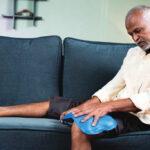In all of medicine, increased emphasis is being placed on technology and the use of guidelines and algorithms in responding to disease. Although rheumatology has certainly participated in these changes, the subspecialty still involves a large clinical component.
SLE Lupus Foundation & His Office Couch
Dr. Harry Spiera’s patient-centered outlook during his 40+ year tenure as chief of rheumatology at Mount Sinai Hospital in New York City also put him at the inception of what grew to be major players in education, research and advocacy.
“The SLE Lupus Foundation basically started on the couch in my office,” says Dr. Spiera. “Susan Golick was a young patient of mine with the disease. From a few women getting together in their living rooms, it evolved into the Lupus Research Alliance of today. The Alliance supports education, research and publicity to more widely spread knowledge of the disease.”
Changes in Education
Dr. Harry Spiera says that rheumatology has also matured in the education of physicians, both in the subspecialty and during medical school. It used to be that exposure to rheumatolgy in medical schools consisted of one or two lectures. This was despite the fact that rheumatic diseases were some of the most common. Now, medical students have a much greater depth of education on these diseases.
“When I started my fellowship training, there were no more than 100 or 200 fellows in the entire U.S,” he noted. “Now, there are more than 70 major programs.”
Dr. Harry Spiera’s fellowship was at Columbia University under Charles Christian, MD, one of the great leaders in the field.
“Those that mentored me were important,” says Dr. Harry Spiera. “When someone is a fellow, it is a close relationship between them and their director. Most fellows, especially in the early years, became heads of their own divisions. It was a very exciting and challenging experience.”
Dr. Harry Spiera was in Dr. Christian’s first group of fellows. Dr. Robert Spiera was in the last.
Trained Rheumatology’s Leaders
Dr. Harry Spiera contributed to the training of several generations of rheumatologist. It has made an impact on many active in the specialty.
“Almost every conference I attend, I am approached by somebody who says Dad was one of their most important influences as a student or a resident,” says Dr. Robert Spiera. “Many of the leaders in rheumatology today were inspired by him. This is a critical part of his educational legacy.


